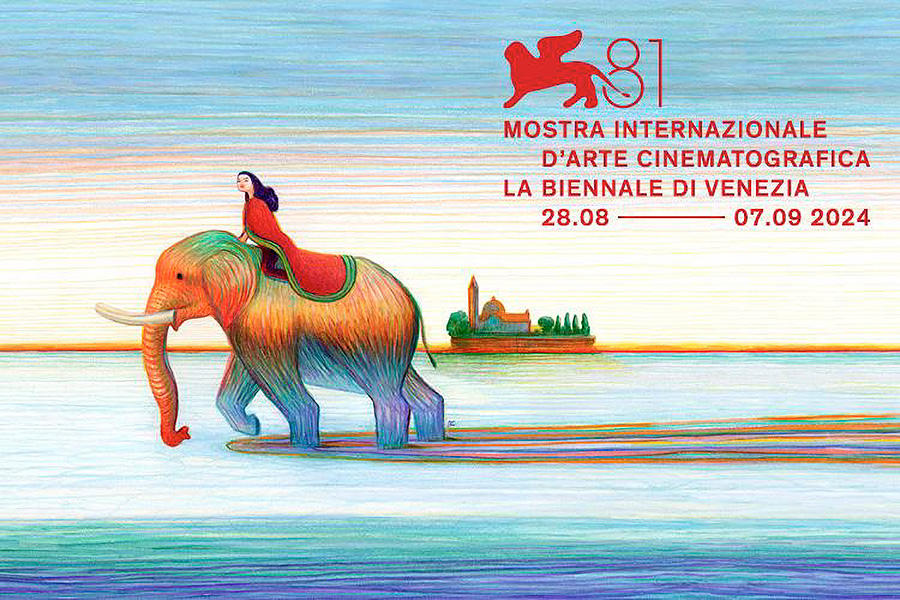
Venice competition 2024
Publié par Birgit Beumers - 27 septembre 2024
Catégorie(s): Cinéma, Expositions / Festivals
Traduction sommaire en français en fin d'article.
Venice 81 Competition
This year’s edition of the Mostra del Cinema opened with Tim Burton’s Beetlejuice, Beetlejuice. One could hardly have thought of a better opening film. A lively and entertaining continuation of Burton’s 1988 Beetlejuice, this sequel starts with Lydia Deetz (Winona Ryder) hosting a television show about supernatural appearances when she spots Beetlejuice (or Beletgeuse, played by the same Michael Keaton). She instantly leaves the studio and is soon drawn into a plot that sees her daughter Astrid abducted into the other world by a boy she befriends. The witch-and-ghost story takes its course, with fine acting from the original crew and new actors, amazing production and costume designs, and numerous funny trick-film interludes, which made the feature popular at the box office after its release following the Venice premiere.
Quite to the contrary, the sequel Joker: Folie a deux by Todd Phillips, which screened in competition, did not fare that well with critics. It seems like an artificially lengthened story that sees the trial of Arthur Fleck (Joaquin Phoenix), set both in prison and in the courtroom, including a romantic involvement with the scientist Harleen Quinzel (played by Lady Gaga). The film veers unsuccessfully between musical and romcom, serving as an example that not every sequel is a success.
On the whole, the competition films were good, but there was nothing special and nothing terrible. The competition films were mostly by established filmmakers, and maybe – like in Cannes – we might like to look for new talent in other programmes, such as Orrizonti in Venice. In the competition, there were several thematic or genre clusters: a number of biopics, several films about family relations, and some more idiosyncratic films.

Biopics.
The competition showcased several biopics or semi-biographical movies, starting with Pablo Larrain’s Maria. The fabulous performance of Angelina Jolie as Callas was certainly a great competitor for the best actress award (which went to Nicole Kidman); she performs with great sensitivity the mental and physical turbulences of the great singer as she spends her last days in Paris in the company of her servant and her cook, beautifully portrayed by Pierfrancesco Favino and Alba Rohrwacher. Flashbacks bring to life her great moments on stage, and her difficult relationship with Onassis.

Brady Corbet’s The Brutalist, scripted with Mona Fastvold and starring Adrian Brody as the Bauhaus-trained architect Laszlo Toth, is a fictional biopic loosely based on the story of Marcel Breuer, a Jewish architect who emigrated to New York in 1947, where he would later be joined by his wife Erszebet and his niece. Toth spends the first years in the US with relatives before he is hired by an entrepreneur, who wants to build a culture centre in memory of his mother. Soon a power game begins between the creative artist and the capitalist Harrison van Buren (played by Guy Pearce) concerned only with money and prestige. The visual style of Laszlo Nemes’ Son Of Saul is evident particularly in the flashbacks to Auschwitz, where Toth spent several years, signalling trauma and confusion. Toth’s wife suffers this trauma physically, bound to a wheelchair in which she moves with the help of her niece she adopts and whose own trauma makes the girl speechless. Those markers in the relationship are also “brutalist” in style, but never subtle enough to be also convincing. The film tries to resolve too many issues at once, foregrounding, it seems, the clash between art and money. The runtime of 215 minute film plus 15 minute interval makes this an epic achievement, which won the best director award.

Luca Guadagnino’s Queer is based on William S Burrough’s unfinished semi-autobiographical novel in which the character of William Lee (played by Daniel Craig) visits Mexico and travels on to the Amazonas to experience ayahuasca. In Mexico, Lee can live out his queerness and explores the effect of alcohol and drugs, allowing the director to experiment with the visualisation of deliria. Craig’s performance convincing and gives the film an edge of James Bond. In a different style comes Justin Kurzel’s The Order, adapted from the non-fiction book The Silent Brotherhood about a series of violent robberies in Idaho in 1983 organised by right-wing radicals. Terry Husk (played by an outstanding Jude Law) is transferred to this godforsaken place but sees criminal connections that Kurzel turns into a politically powerful and resonant action thriller, which is not really competition fare.
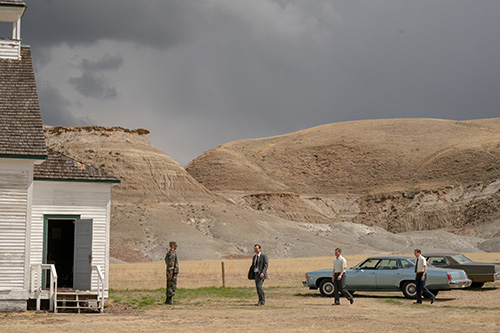
Another biopic comes from Walter Salles, who returns to the European festival circuit with a powerful film titled I’m Still Here (Ainda estou aqui) which is set against the backdrop of the Brazilian military dictatorship in the 1970s and explores the arrest and disappearance of Rubens Paiva in 1971, based on Marcelo Rubens Paiva’s book. Salles’ Central Station, which won the Golden Bear at Berlin in 1998, starred Fernanda Montenegro, who went on to win an Oscar and a Golden Globe for Best Actress. In this film, she makes an appearance as the aged Eunice, the widow of Rubens, while her daughter Fernanda Torres appears as Paiva’s young wife and mother of five children. This casting choice justifies the apparently drawn-out ending of this film (taking us from 1971 to the late 1970s, then 1990s and then 2010s), which offers stunning insights into the political machinations of Brazilian politics of the 1970s and 1980s, but most importantly, shows the perseverance of Eunice with her human rights activism and caring for her children. Whilst letting go of her past life, her friends, her roots, she builds a new life without ever betraying the humanist ideals of her late husband.
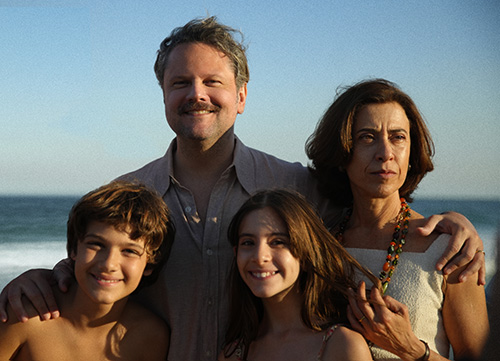
Family Relationships.
The three French films in competition all addressed relationships: Emmanuel Mouret’s Three Friends (Trois amies) develops a plot around the relationships of three women friends (played by Camille Cottin, Sara Forestier and India Hair) and their marriages or affairs. Leurs Enfants apres eux by Ludovic and Zoran Boukherma stretches over a longer time period and starts in 1992, when teenagers Anthony (Paul Kircher, award for talent) and his cousin meet two girls by a lake. The film begins with first love and social difference, and soon weaves in a narrative about racial conflict ignited by a motorbike stolen by a jealous Moroccan teenager in an act of revenge. Step by step, the film takes us through the 1990s, and through the maturation of the boys and different turns in their lives.

Delphine and Muriel Coulin’s Jouer avec le feu (The Quiet Son) stars Vincent Lindon as father Pierre, a role for which Lindon took the award for Best Actor. Pierre is much respected at work and in the community, raising his two teenage boys alone after the death of his wife: Louis, who will go to university in Paris, and Fus, who plays football in his spare time. When Fus is drawn into the right-wing extremist spectrum, Pierre tries everything to support and help him, but he can barely save his son. The dilemma of extremism and political rifts and their impact on families is demonstrated poignantly in this film.

Dutch actor and filmmaker Halina Reijn’s Babygirl is set in the present-day and features Nicole Kidman (best actress) in the role of Romy, a powerful company executive who satisfies her sexual needs with an intern, although she is happily married with two teenage daughters. In some sense, the film turns the MeToo campaign upside down, making the woman the abuser who is dependent on a young male. However, this woman ultimately remains in control and has a grip on everything, even if this potentially comedic side is not brought out in the film.

Solitary achievements
Athina Rachel Tsangari’s Harvest is an adaptation of Jim Crace’s novel set in the 17th-century about Walter Thirsk (Caleb Landry Jones), who lost his wife, as did Master Kent; the two men become friends in their sorrow, even if they are of different social status. Kent’s position as master is challenged when his nephew takes over the inheritance and brings in new rules: the land is measured by Mr Earle, known as Quill; the vibrant life, folk songs, and self-sustained existence is turned into a profitable business of producing only wool. References to contemporary politics about the land and ecology abound. A similar theme lies at the heart of the secluded community portrayed in Maura Delpero’s Vermiglio, the only Italian film to garner any prize.
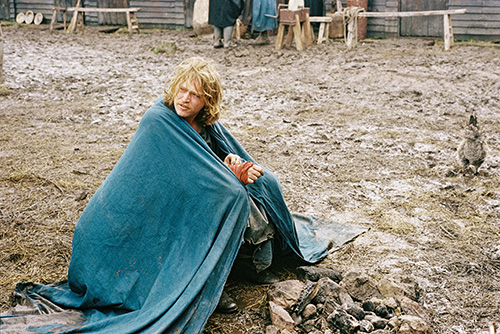
Dea Kulumbegashvili’s April is a visually powerful sophomore film. Several scenes of a distorted body bending in the rain, appearing in the moor, levitating in a room, marching in a field form interlides that serve as a reference to Nina’s childhood experience of seeing her sister stuck in the moors and unable to save her. Nina (Ia Sukhitashvili) is an obstetrician, who performs illegally abortions for girls in the villages who cannot afford to go to a city clinic. Her own life is troubled, by relationships and by her childhood trauma.
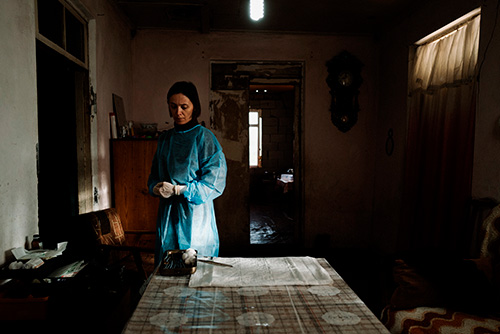
Pedro Almodovar’s The Room Next Door is no doubt an accomplished masterpiece about dying, based on the novel by Sigrid Nunez: Ingrid (Julianne Moore) is a writer, Martha (Tilda Swinton) is a war reporter. At a book signing, Ingrid learns about Martha’s sickness and visits her in hospital. Martha has terminal cancer, and the experimental therapy does not have the desired effect. From this furtive hospital visit develops a commitment, in which Ingrid agrees to accompany Martha to a mansion out of NY city and stay at the house with her when Martha ends her life, using a pill she has bought on the dark net. All the conditions are openly discussed, yet for Ingrid there remains a risk to be accused – even if she can claim she did not know about the plan and Martha’s note confirms this. The setting is beautifully chosen, the lavish NY apartment and sterile hospital room, but most exuberant is the house Martha rents to spend her final days in a forest. This is Almodovar’s English-language debut, and the film gains doubtless from the performance of Moore and Swinton, making it a deserving winner of the Golden Lion.

Awards
Golden Lion – The Room Next Door, dir. Pedro Almodovar
Special Jury Prize – April, dir. Dea Kulumbegashvili
Silver Lion Grand Jury Prize – Vermiglio, dir. Maura Delpero
Silver Lion for best director – Brady Corbet for The Brutalist
Volpi Cup for Best Actress – Nicole Kidman for Babygirl
Volpi Cup for Best Actor – Vincent Lindon for The Quiet Son
Golden Osella for Best Screenplay – Murilo Hauser, Heitor Lorega for I’m Still Here
Marcello Mastroianni Award – Paul Kircher for And Their Children After Them

Venice 81 Competition
L'édition 2024 de la Mostra del Cinema s'est ouverte avec Beetlejuice, Beetlejuice de Tim Burton. On aurait difficilement pu imaginer un meilleur film d'ouverture. Pétillant et divertissant, cette suite du Beetlejuice de Burton sorti en 1988 débute avec Lydia Deetz (Winona Ryder) animant une émission télévisée sur les apparitions surnaturelles, lorsqu'elle aperçoit Beetlejuice (ou Bételgeuse, incarné par le même Michael Keaton). Elle quitte immédiatement le studio et se retrouve bientôt impliquée dans un complot où sa fille Astrid est enlevée dans l'autre monde par un garçon qu'elle vient de rencontrer. L'intrigue sorcières-et-fantômes suit son cours, portée par des performances remarquables de l'équipe originale et des nouveaux acteurs, des décors et costumes stupéfiants, ainsi que de nombreuses séquences de trucages amusants qui ont fait du film un succès au box-office lors de sa sortie, suite à sa première à Venise.
Au contraire, la suite Joker : Folie à deux de Todd Phillips, présentée en compétition, n'a pas rencontré le même succès auprès de la critique et des festivaliers. Le film semble être une histoire artificiellement allongée, mettant en scène le procès d'Arthur Fleck (Joaquin Phoenix) qui se déroule à la fois en prison et au tribunal avec une implication romantique entre lui et la scientifique Harleen Quinzel (Lady Gaga). Le film oscille maladroitement entre comédie musicale et comédie romantique, illustrant ainsi que toutes les suites ne sont pas forcément des réussites.
Dans l'ensemble, les films en compétition étaient bons, mais rien de particulièrement marquant ou de catastrophique. La sélection était majoritairement composée de réalisateurs confirmés. Peut-être – comme à Cannes – serait-il judicieux de chercher de nouveaux talents dans d'autres programmes, tels que Orrizonti à Venise. En compétition, plusieurs thèmes ou genres se sont distingués : un certain nombre de biopics, plusieurs films sur les relations familiales et quelques œuvres plus singulières.
Biopics.
La compétition a mis en avant plusieurs biopics ou films semi-biographiques comme Maria de Pablo Larraín. La performance époustouflante d'Angelina Jolie dans le rôle de Maria Callas faisait certainement de l'actrice une sérieuse prétendante au prix d'interprétation féminine (finalement décerné à Nicole Kidman). Elle interprète avec une grande sensibilité les tourments mentaux et physiques de la célèbre cantatrice qui passe ses derniers jours à Paris accompagnée de son domestique et de son cuisinier, magnifiquement interprétés par Pierfrancesco Favino et Alba Rohrwacher. Des flashbacks ressuscitent les moments de gloire sur scène de la cantatrice ainsi que sa relation tumultueuse avec Onassis.
The Brutalist de Brady Corbet, coécrit avec Mona Fastvold et mettant en vedette Adrian Brody dans le rôle de l'architecte formé au Bauhaus, Laszlo Toth, est un biopic fictif librement inspiré de l'histoire de Marcel Breuer, un architecte juif ayant émigré à New York en 1947. Il est rejoint plus tard par sa femme Erszebet et sa nièce. Toth passe ses premières années aux États-Unis chez des proches avant d'être embauché par un entrepreneur qui souhaite construire un centre culturel en mémoire de sa mère. Un jeu de pouvoir s'installe rapidement entre l'artiste créatif et le capitaliste Harrison van Buren (Guy Pearce), uniquement préoccupé par l'argent et le prestige.
Le style visuel rappelle celui de Le Fils de Saul de László Nemes, notamment dans les flashbacks d'Auschwitz, où Toth a passé plusieurs années, afin de souligner son traumatisme et sa confusion. La femme de Toth subit, elle, ce traumatisme physiquement. Elle se retrouve à devoir circuler en fauteuil roulant aidée par sa nièce, qu'elle adopte, rendue , elle, muette par le traumatisme vécu. Ces éléments qui aident à définir leur relation sont également « brutalistes » dans leur style mais l'ensemble manque parfois de subtilité pour être véritablement convaincant. Le film tente de traiter trop de thématiques à la fois, mettant en avant, semble-t-il, le conflit entre art et argent. Avec une durée de 215 minutes, plus un entracte de 15 minutes, il s'agit d'une réalisation épique qui a valu à Corbet le prix du meilleur réalisateur.
Queer de Luca Guadagnino est inspiré du roman semi-autobiographique inachevé de William S. Burroughs, dans lequel le personnage de William Lee (Daniel Craig) se rend au Mexique avant de voyager en Amazonie pour expérimenter l'ayahuasca. Au Mexique, Lee peut vivre pleinement sa queerness et explore les effets de l'alcool et des drogues, ce qui permet au réalisateur d'expérimenter la visualisation des délires. La performance convaincante de Craig donne au film une touche rappelant James Bond.
Dans un style différent, The Order de Justin Kurzel s'inspire du livre de non-fiction The Silent Brotherhood, qui repose sur une série de braquages violents organisés par des radicaux d'extrême droite en Idaho en 1983, Terry Husk (Jude Law) est transféré dans ce lieu perdu. Il repère des connexions criminelles que Kurzel transforme en un thriller d'action politiquement percutant et résonnant, bien que ce ne soit pas tout à fait un film de compétition.
Un autre biopic marquant est celui de Walter Salles, qui revient sur le circuit des festivals européens avec un film puissant intitulé I’m Still Here (Ainda estou aqui), se déroulant sur fond de dictature militaire brésilienne dans les années 1970. Le film explore l'arrestation et la disparition de Rubens Paiva en 1971, s'inspirant du livre de Marcelo Rubens Paiva. Salles, qui avait remporté l'Ours d'or à Berlin en 1998 pour Central do Brasil, avec Fernanda Montenegro dans le rôle principal, la retrouve dans ce film, où elle incarne Eunice, la veuve de Rubens, dans ses dernières années. Sa fille, Fernanda Torres, joue la jeune épouse de Paiva, mère de cinq enfants. Ce choix de casting justifie la fin apparemment longue du film (qui nous emmène des années 1970 aux années 1990, puis aux années 2010), offrant des aperçus saisissants des rouages politiques du Brésil des années 1970 et 1980. Mais surtout, le film met en lumière la persévérance d’Eunice dans son activisme pour les droits de l'homme et sa dévotion envers ses enfants. Tout en tournant la page de sa vie passée, ses amis et ses racines, elle construit une nouvelle vie sans jamais trahir les idéaux humanistes de son défunt mari.
Relations familiales.
Les trois films français en compétition ont tous abordé les relations humaines. Trois amies d'Emmanuel Mouret développe une intrigue autour des relations de trois amies (interprétées par Camille Cottin, Sara Forestier et India Hair) et leurs mariages ou liaisons. Leurs enfants après eux de Ludovic et Zoran Boukherma s'étend sur une période plus longue. Le film débute en 1992, lorsque les adolescents Anthony (Paul Kircher) et son cousin rencontrent deux filles près d'un lac. Le film commence par dépeindre les premiers amours et les différences sociales avant d'intégrer une intrigue autour d'un conflit racial déclenché par le vol d'une moto perpété par un adolescent marocain vengeur et jaloux. Progressivement, le film nous fait traverser les années 1990 et suivre la maturation des garçons ainsi que les tournants marquants de leurs vies.
Jouer avec le feu (The Quiet Son) des sœurs Delphine et Muriel Coulin met en vedette Vincent Lindon dans le rôle d'un père qui élève seul ses deux fils après la mort de sa femme. Un rôle qui a valu à Lindon le prix du meilleur acteur. Pierre est très respecté tant au travail que dans sa communauté. Ses deux fils sont adolescents : Louis (Stefan Crepon) s'apprête à aller à l'université à Paris, et Fus (Benjamin Voisin), qui passe son temps à jouer au football pendant son temps libre. Lorsque Fus s'engage dans le spectre extrémiste de droite, Pierre fait tout ce qu'il peut pour le soutenir et l'aider, mais il a du mal à sauver son fils. Le dilemme de l'extrémisme et des fractures politiques, ainsi que leur impact sur les familles, est dépeint de manière poignante dans ce film.
Babygirl de l’actrice et réalisatrice néerlandaise Halina Reijn se déroule à notre époque et met en vedette Nicole Kidman (meilleure actrice) dans le rôle de Romy, une puissante cadre d’entreprise qui satisfait ses besoins sexuels avec un stagiaire bien qu'elle soit heureuse en mariage et mère de deux adolescentes. D'une certaine manière, le film renverse la campagne MeToo, faisant de la femme celle qui abuse de l'autre, dépendante d'un jeune homme. Cependant, cette femme reste finalement aux commandes et a prise sur tout, même si cet aspect potentiellement comique n'est pas vraiment mis en avant dans le film.
Réalisations solitaires
Harvest d'Athina Rachel Tsangari est une adaptation du roman de Jim Crace, se déroulant au XVIIe siècle et suivant Walter Thirsk (Caleb Landry Jones), qui a perdu sa femme, tout comme Master Kent. Les deux hommes, partageant la même douleur, deviennent amis malgré leurs différences de statut social. La position de Kent en tant que maître est remise en question lorsque son neveu prend la relève de l'héritage et impose de nouvelles règles : la terre est mesurée par M. Earle, surnommé Quill ; la vie vibrante, les chansons populaires et l'existence autonome se transforment en une entreprise lucrative ne produisant que de la laine. Les références à la politique contemporaine concernant la terre et l'écologie sont omniprésentes. Un thème similaire se trouve au cœur de la communauté isolée dépeinte dans Vermiglio de Maura Delpero, le seul film italien à avoir remporté un prix.
April de Dea Kulumbegashvili est un deuxième film visuellement puissant. Plusieurs scènes montrent un corps déformé se pliant sous la pluie, apparaissant dans la lande, lévitant dans une pièce, et marchant dans un champ. Ces interludes font référence à l'expérience d'enfance de Nina, qui a vu sa sœur coincée dans les tourbières sans pouvoir la sauver. Nina (Ia Sukhitashvili) est obstétricienne et pratique illégalement des avortements pour des jeunes filles des villages qui ne peuvent pas se permettre de se rendre dans une clinique en ville. Sa propre vie est troublée tant par ses relations que par son traumatisme d'enfance.
The Room Next Door de Pedro Almodóvar, adapté du roman de Sigrid Nunez, est sans aucun doute un chef-d'œuvre accompli sur la mort. Ingrid (Julianne Moore) est écrivain, tandis que Martha (Tilda Swinton) est reporter de guerre. Lors d'une séance de dédicace, Ingrid apprend la maladie de Martha et lui rend visite à l'hôpital. Martha souffre d'un cancer en phase terminale et la thérapie expérimentale n'a pas l'effet escompté. De cette visite furtive à l'hôpital naît un engagement : Ingrid accepte d'accompagner Martha dans un manoir hors de New York et de rester avec elle lorsqu'elle mettra fin à sa vie en prenant une pilule achetée sur le darknet. Toutes les conditions sont discutées ouvertement, mais pour Ingrid, subsiste le risque d'être accusée – même si elle peut affirmer qu'elle n'était pas au courant du plan et que la note de Martha le confirme. Le cadre est superbement choisi, entre le somptueux appartement new-yorkais et la chambre d'hôpital stérile, mais c'est la maison que Martha loue pour passer ses derniers jours dans une forêt qui est la plus exubérante. C'est le premier film en langue anglaise d'Almodóvar, et le film tire sans doute profit des performances de Moore et Swinton. Lion d'or mérité.
